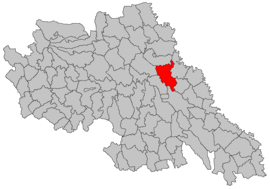Popricani
Popricani | |
|---|---|
 Location in Iași County | |
| Coordinates: 47°18′N 27°31′E / 47.300°N 27.517°E | |
| Country | Romania |
| County | Iași |
| Government | |
| • Mayor (2020–2024) | Ion Tănasă (PNL) |
| Area | 69.62 km2 (26.88 sq mi) |
| Elevation | 156 m (512 ft) |
| Population (2021-12-01)[1] | 7,236 |
| • Density | 100/km2 (270/sq mi) |
| Time zone | EET/EEST (UTC+2/+3) |
| Postal code | 707380 |
| Area code | +(40) 232 |
| Vehicle reg. | IS |
| Website | primariapopricani |
Popricani is a commune in Iași County, Western Moldavia, Romania, part of the Iași metropolitan area. It is composed of nine villages: Cârlig, Cotu Morii, Cuza Vodă, Moimești, Popricani, Rediu Mitropoliei, Țipilești, Vânători, and Vulturi.
The commune is located in the east-central part of the county, 16.5 km (10.3 mi) north of the county seat, Iași. It is crossed by the national road DN24C, which starts in Iași and goes up along the Prut River valley towards the border crossing with Moldova at Lipcani.
Mass grave
[edit]In November 2010, a mass grave dating from 1941 was discovered in the nearby forest of Vulturi. It is believed to contain the remains of up to a hundred Jewish men, women and children murdered by Romanian authorities contemporaneously with the nearby Iași pogrom.[2][3][4] It is the first such grave found in Romania since the 1945 discovery of 311 bodies at Stânca-Roznovanu, also in the vicinity of Iași.[5][6] An official report concluded that the grave contained 36 victims, and that those responsible for the killing had already been sentenced in 1948.[7]
Popricani in Jewish literature
[edit]The village of Popricani was featured in the 1953 memoir Mayn tatns khretshme ("My Father's Tavern") by Yiddish writer Yitskhok Horowitz.[8] Horowitz recounts his childhood in the family tavern, growing up in the sole Jewish family in the village of Popricani, with episodic tales of wolves, Shabbat, and the 1907 Romanian Peasants' Revolt.[9] An English translation of the book, "The Tavern of Popricani" translated by Ollie Elkus, was published by Naydus Press in 2022.[10]
References
[edit]- ^ "Populaţia rezidentă după grupa de vârstă, pe județe și municipii, orașe, comune, la 1 decembrie 2021" (XLS). National Institute of Statistics.
- ^ "'Holocaust grave' discovered in Romania". BBC News. 5 November 2010. Retrieved 6 November 2010.
- ^ "Holocaust-era mass grave discovered". The Press Association (UK). Retrieved 6 November 2010.[dead link]
- ^ "Descoperire istorică la Iaşi" (in Romanian). TVR. 5 November 2010. Archived from the original on 12 June 2011. Retrieved 6 November 2010.
- ^ Marinas, Radu (Nov 5, 2010). "World War Two mass grave of Jews found in Romania". Reuters Africa. p. 2. Archived from the original on June 12, 2012. Retrieved 6 November 2010.
- ^ Braham, Randolph L. (1997). The destruction of Romanian and Ukrainian Jews during the Antonescu era. Holocaust studies series East European monographs. Social Science Monographs. p. 73. ISBN 978-0-88033-380-1.
- ^ Decizie fără precedent la Iași privind masacrul evreilor, ziare.com, April 2014. Retrieved February 2015.
- ^ Horowitz, Yitskhok (1953). Mayn tatns kretshme. New York: Farlag Matones.
- ^ Horowitz, Yitskhok (2022). The Tavern of Popricani. Translated by Elkus, Ollie. Cincinnati, Ohio: Naydus Press. ISBN 978-1-7341936-1-9.
- ^ "The Tavern of Popricani". 6 April 2022.


